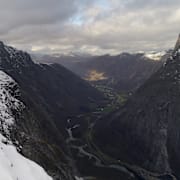
Studie: Atlantströmmar kan kollapsa inom några år
Ett viktigt system av vattenströmmar i Atlanten, kallat Atlantic meridional overturning circulation (Amoc), kan kollapsa redan under 2030-talet på grund av mänsklig klimatpåverkan. Det visar en ny studie som använt sig av nyskapande beräkningsmodeller, skriver CNN.
– Det är väldigt oroväckande, säger medförfattaren René van Westen, havs- och atmosfärforskare vid universitetet i nederländska Utrecht.
Enligt studien tros Amoc kollapsa mellan 2037 och 2064. Det skulle göra delar av världen oigenkännliga – temperaturen skulle sjunka drastiskt i Europa och Nordamerika, och inom 100 år skulle de arktiska isarna ha krupit ner till södra England. I Amazonas skulle regn- och torrperioden byta plats.
Amoc är ett kretslopp som för varmt ytvatten från södra Atlanten norrut, där kallare vatten med högre salthalt i sin tur sjunker och flödar söderut.



